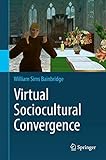Virtual Sociocultural Convergence [electronic resource] / by William Sims Bainbridge.
By: Bainbridge, William Sims [author.].
Contributor(s): SpringerLink (Online service).
Material type: BookPublisher: Cham : Springer International Publishing : Imprint: Springer, 2016Description: VII, 260 p. 33 illus., 32 illus. in color. online resource.Content type: text Media type: computer Carrier type: online resourceISBN: 9783319330204.Subject(s): Computer science | User interfaces (Computer systems) | Application software | Computers and civilization | Personality | Social psychology | Computer Science | Computers and Society | User Interfaces and Human Computer Interaction | Personality and Social Psychology | Computer Appl. in Social and Behavioral SciencesAdditional physical formats: Printed edition:: No titleDDC classification: 004 Online resources: Click here to access online
BookPublisher: Cham : Springer International Publishing : Imprint: Springer, 2016Description: VII, 260 p. 33 illus., 32 illus. in color. online resource.Content type: text Media type: computer Carrier type: online resourceISBN: 9783319330204.Subject(s): Computer science | User interfaces (Computer systems) | Application software | Computers and civilization | Personality | Social psychology | Computer Science | Computers and Society | User Interfaces and Human Computer Interaction | Personality and Social Psychology | Computer Appl. in Social and Behavioral SciencesAdditional physical formats: Printed edition:: No titleDDC classification: 004 Online resources: Click here to access online Introduction: Virtual Sociocultural Convergence -- Technological Determinism in Construction of an Online Society -- Convergence in Online Urban Environments -- Social Organizations in Online Virtual Worlds -- Autonomy within Rigid Rule-Based Systems -- Modeling Social Stratification in Online Games -- Linguistic Convergence and Divergence in Middle Earth -- Functional Equivalence across Virtual Cultures -- Individual Incentives for Investment in Gameworlds -- Divergence in the Fall of a Virtual Civilization -- Alienation and Assimilation in a Warcraft World.
This book explores the remarkable sociocultural convergence in multiplayer online games and other virtual worlds, through the unification of computer science, social science, and the humanities. The emergence of online media provides not only new methods for collecting social science data, but also contexts for developing theory and conducting education in the arts as well as technology. Notably, role-playing games and virtual worlds naturally demonstrate many classical concepts about human behaviour, in ways that encourage innovative thinking. The inspiration derives from the internationally shared values developed in a fifteen-year series of conferences on science and technology convergence. The primary methodology is focused on sending avatars, representing classical social theorists or schools of thought, into online gameworlds that harmonize with, or challenge, their fundamental ideas, including technological determinism, urban sociology, group formation, freedom versus control, class stratification, linguistic variation, functional equivalence across cultures, behavioural psychology, civilization collapse, and ethnic pluralism. Researchers and students in the social and behavioural sciences will benefit from the many diverse examples of how both qualitative and quantitative science of culture and society can be performed in online communities of many kinds, even as artists and gamers learn styles and skills they may apply in their own work and play.


There are no comments for this item.